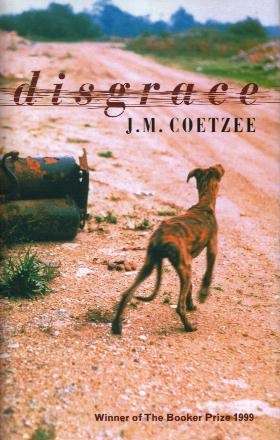
J.M. Coetzee
The following novels constitute the shortlist for the 1999 Booker Prize:
Notable Omissions from the 1999 Shortlist

|
Disgrace J.M. Coetzee |
Dustjacket synopsis:
"David Lurie, middle-aged and twice divorced, is a scholar fallen into disgrace. After years teaching Romantic
poetry at the Technical University of Cape Town, he has an impulsive affair with a student. The affair sours; he
is denounced and summoned before a committee of inquiry. Willing to admit his guilt, but refusing to yield to
pressure to repent publicly, he resigns and retreats to an isolated smallholding owned by his daughter Lucy.
"For a time, his daughter's influence and the natural rhythms of the farm promise to harmonise his discordant life. He helps with the dogs in the kennels, takes produce to market, and assists with treating injured animals at a nearby refuge.
"But the balance of power in the country is shifting. He and Lucy become victims of a savage and disturbing attack which brings into relief all the faultlines in their relationship.
"Chilling, uncompromising and unforgettable, Disgrace is a masterpiece."
Quotes:
"This novel stands as one of the few I know in which the writer's use of the present tense is in itself enough to shape
the structure and form of the book as a whole. Even though it presents an almost unrelieved series of grim moments,
Disgrace isn't claustrophobic or depressing, as some of Coetzee's earlier work has been. Its grammar allows for the
sublime exhilaration of accident and surprise, and so the fate of its characters -- and perhaps indeed of their country --
seems not determined but improvised. Improvised in the way that our own lives are; improvised in a way that recalls the
subject of Coetzee's 1994 novel, The Master of Petersburg, the novelist whom we know as Dostoyevsky." - Michael
Gorra, New York Times
First Paragraph:
For a man of his age, fifty-two, divorced, he has, to his mind, solved the problem of sex rather well. On Thursday afternoons he drives to Green Point. Punctually at two p.m. he presses the buzzer at the entrance to Windsor Mansions, speaks his name, and enters. Waiting for him at the door of No. 113 is Soraya. He goes straight through to the bedroom, which is pleasant-smelling and softly lit, and undresses. Soraya emerges from the bathroom, drops her robe, slides into bed beside him. 'Have you missed me?' she asks. 'I miss you all the time,' he replies. He strokes her honey-brown body, unmarked by the sun; he stretches her out, kisses her breasts; they make love.
From the Seeker & Warburg hardback edition, 1999.
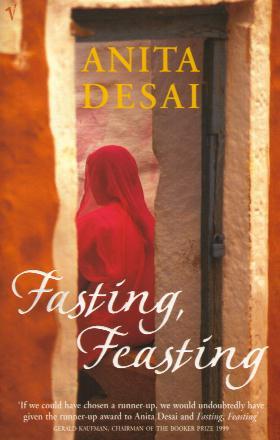
|
Fasting, Feasting Anita Desai |
Dustjacket synopsis:
"Uma, the plain, spinster daughter of a close-knit Indian family, is trapped at home, smothered by her overbearing parents
and their traditions, unlike her ambitious younger sister Aruna, who brings off a 'good' marriage, and brother Arun, the
disappointing son and heir who is studying in America.
"Across the world in Massachusetts, life with the Patton family is bewildering for Arun in the alien culture of freedom, freezers and paradoxically self-denying self-indulgence."
Quotes:
"If we could have a chosen a runner-up, we would undoubtedly have given the runner-up award to Anita Desai and
Fasting, Feasting; a most beautiful novel, very moving, very funny, terribly illustrative of what happens to women
in different parts of the world." - Gerald Kaufman, Chairman of the Booker Prize 1999
"Anita Desai is one of Tolstoy's inheritors. Like his, her writing is senuous, radical and uncannily perceptive...
Fasting, Feasting is a hypnotically readable story, in language which has the precision of poetry...an ambitious,
successful and disturbing novel" - The Times
"In Fasting, Feasting - the most recent in a series of outstanding fictons - she returns to a world which is already
disappearing and a milieu of which sh remains the peerless chronicler...This is a compelling, mature work by India's
finest writer in English" - Independent
"This is a quiet, low-key novel, notable for its vignettes...[which] are so sharp, so rich in detail, that the book packs
a polemic punch...Fasting, Feasting is a fine showcase for the delicate, distinctive skills of Anita Desai" -
Sunday Telegraph
First Paragraph:
On the veranda overlooking the garden, the drive and the gate, they sit together on the creaking sofa-swing, suspended from its iron frame, dangling their legs so that the slippers on their feet hang loose. Before them, a low round table is covered by a faded cloth, embroidered in the centre with flowers. Behind them, a pedestal fan blows warm air at the backs of heir heads and necks.
The cane mats, which hang from the arches of the veranda to keep out the sun and dust, are rolled up now. Pigeons sit upon the rolls, conversing tenderly, picking at ticks, fluttering. Pigeon droppings splatter the stone tiles below and feathers float torpidly through the air.
The parents sit, rhythmically swinging, back and forth. They could be sleeping, dozing - their eyes are hooded - but sometimes they speak.
From the Vintage paperback edition, 2000.
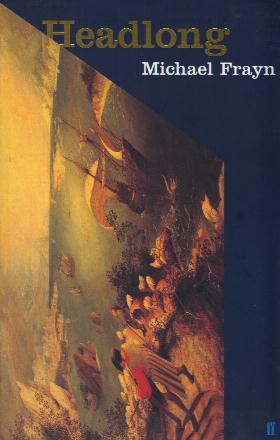
|
Headlong Michael Frayn |
Dustjacket synopsis:
"'I have a discovery to report. Many of the world's great treasures are known to have been lost over the centuries. I
believe I may have found one of them...'
"So begins the story as told by Martin Clay, a young would-be art historian, as he suddenly sees opening in front of him the chance of a lifetime: the opportunity to perform a great public service, and at the same time to make his professional reputation - perhaps even rather a lot of money as well.
"But at once the difficulties begin. The treasure he has found is in someone else's possession, and to get his hands on it he has to shed his natural innocence and exploit the owner's natural duplicity and greed by setting up a classic sting. To finance this he has to mortgage his family's future, and to justify to his increasingly alarmed and sceptical wife the risks he is taking he has to find some objective evidence to support his first brief flash of intuition.
"And so he finds himself drawn step by step into a moral and intellectual labyrinth. He is forced into more and more complex deceptions - and a more and more hair-raising dependance on his victim's reckless and disaffected young wife - even as he pursues his obsessive quest back through history to confront one of the great unsolved mysteries of European art. His venture becomes a kind of detective story - and a painful moral and social comedy."
First Paragraph:
I have a discovery to report. Many of the world's great treasures are known to have been lost over the centuries. I believe I may have found one of them. What follows is the evidence for my claim.
I'm in a difficult position, though. If my claim is not accepted by scholars I shall look a fool. If it is...then I shall be in a worse position. The circumstances of the discovery are such that I shall emerge not only as a fool but as an object of outrage and horror.
I could say nothing, and no one would ever know. But if I have any pretensions to be a scholar - even to be a normally civilized human being - then I have an obligation to put my findings on record, so that my colleagues and successors, now and down the years, can evaluate them. And I must describe the tangled circumstances of this discovery of mine as fully and honestly as I can, because to arrive at a judgement they will need to examine them in the minutest detail.
From the Faber and Faber paperback edition, 1999.
Notes:
This novel was the winner of the 1999 Whitbread Novel Award.
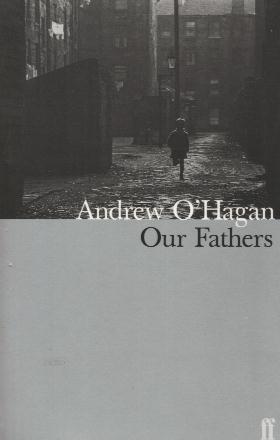
|
Our Fathers Andrew O'Hagan |
Dustjacket synopsis:
"Hugh Bawn was a Modernist hero. A dreamer, a Socialist, a man of the people, he led Scotland's building programme after
the war. Now he lies on a bed on the eighteenth floor. The times have changed. His flats are coming down. The idealism
he learned from his mother is gone. And even as his breath goes out he clings with to the old ways. His final months are
plagued by memory and loss, by a bitter sense of his family and his country, who could not live up to the houses he
built for them.
"Hugh's grandosn, Jamie, comes home to watch over his dying mentor. The old man's final months bring Jamie to see what is best and worst in the past that haunts them all, and he sees the fears of his own life unravel in the land that bred him. He tells the story of his own family - a tale of pride and delusion, of nationality and strong drink, of Catholic faith and the end of the old Left. It is a tale of dark hearts and modern houses, of three men in search of Utopia."
First Paragraph:
I know nothing of the house I was born in. The look of the town is all I remember. And yet I can hear the sound of the door as we closed it behind us for good. I sat by myself on the train leaving Berwick: six years old in long trousers. Jamie the boy with the watery eyes. That was me. And something of me will be sat there still. My eyes looked into my eyes in the glass. The town of Berwick was out of reach, beyond the window, and quiet at last. Under the mound of the railway station the sea lapped on the brown sand. Every wave brought forgiveness to the shore. And now I am left with the thought of that day. The English town I left as a boy: the closing door.
The houses looked into the North Sea. They peered at the saline darkness: a world of algae and sea sounds. As a child I wondered where is all went. Miles of sea and miles of dark. They say nothing goes on for ever. Even the tide goes somewhere in the end.
From the Vintage paperback edition, 1997.

|
The Map of Love Ahdaf Soueif |
Dustjacket synopsis:
"In 1900 Lady Anna Winterbourne travels to Egypt where she falls in love with Shaif, an Egyptian Nationalist utterly
committed to his country's cause.
"A hundred years later, Isabel Parkman, an Amerian divorcee and a descendant of Anna and Sharif, goes to Egypt, taking with her an old family trunk, inside which are found notebooks and journals which reveal Anna and Sharif's secret."
Quotes:
"By general agreement [of the Booker Prize committee], the 'best read' of the shortlist. A romance of the desert"
- John Sutherland, Guardian
"Magnificent...Reminiscent of Marquez and Allende" - Guardian
"Filled with subtlety, grace and beauty...The Map of Love is honest and intellectual. It takes on a range of topics
in the way Dickens did, fusing life, art, history, class and culture into a huge vibrant novel" - Big Issue
"A triumphant achievement" - Literary Review
"Rich with historical detail and debate. Egypt emerges as the true heroine of this novel" - Independent
"Soueif is a political analyst and commentator of the best kind" - London Review of Books
First Paragraph:
- and there, on the table under her bedroom window, lies the voice that has set her dreaming again. Fragments of a life lived a long, long time ago. Across a hundred years the woman's voice speaks to her - so clearly that she cannot believe it is not possible to pick up her pen and answer.
The child sleeps. Nur al-Hayah: light of my life.
Anna must have put aside her pen, Amal thinks, and looked down at the child pressed into her side: the face flushed with sleep, the mouth slightly open, a damp tendril of black hair clinging to the brow.
I have tried, as well as I could, to tell her. But she cannot - or wili not - understand, and give up hope. She waits for him constantly.
Amal reads and reads deep into the night. She reads and lets Anna's words flow into her, probing gently at dreams and hopes and sorrows she had sorted out, labelled and put away.
From the Bloomsbury paperback edition, 2000.
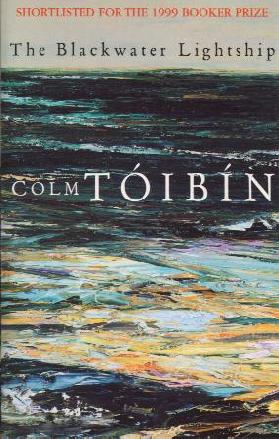
|
The Blackwater Lightship Colm Tóibín |
Dustjacket synopsis:
"It is Ireland in the early 1990s. Three women, Doras Devereux, her daughter Lily and her grand-daughter Helen, have
arrived, after years of strife, at an uneasy pece with each other. They know that in the years ahead it will be
necessary for them to keep their distance. Now, however, Declan, Helen's adored brother, is dying and the three of
them come together in the grandmother's crumbling old house with two of Declan's friends. All six of them, from different
generations and with different beliefs, are forced to listen to each other and come to terms with each other.
"The Blackwater Lightship is a novel about morals and manners, about culture clashes and clashes of personalities, but it is also a novel full of stories. Written in a spare powerful prose, it is an astonishingly acute and moving work which offers sharp and memorable insights into the nature of love and family, and dramatizes the lives of characters who appear remarkably exact and real. It is Colm Tóibín's finest achievement."
First Paragraph:
Helen woke in the night to the sound of Manus whimpering. She lay still and listened, hoping that he would quieten and turn on his side and sleep, but when his voice became louder and more insistent and she could vaguely make out words, she got out of bed and moved towards the boys' room; she was unsure whether he was dreaming or awake.
She had left the landing light switched on and she was able to see, as soon as she came into the room, that Cathal had his eyes wide open. he looked at her from the bed, an uninvolved spectator in the scene about to be enacted; he then looked over at his brother, who was crying out hoarsely and fending off some unknown terror with his arms. She woke Manus gently and pulled back the blankets which covered him. He was too hot. Only half awake and rubbing his eyes, he began to whimper again. It took him a while to realise that she was there and the dream was over.
'I was frightened,' he said.
'You're all right now. Maybe you'll go back asleep.'
'I don't want to go back asleep,' he said, and began to cry.
'Will I carry you into our bed?' she asked.
He nodded. He was motionless now, sobbing, waiting to be comforted. She knew that it would be better if she stayed with him and soothed him until he fell asleep again, but she lifted him and let him cling to her. Always, when she held him like this, he became quiet.
Cathal was still watching them.
From the Picador paperback edition, 1999.
Reviews:This page and its contents are copyright © 2002-05 by Perry Middlemiss, Melbourne, Victoria, Australia.
Last modified: October 18, 2005.